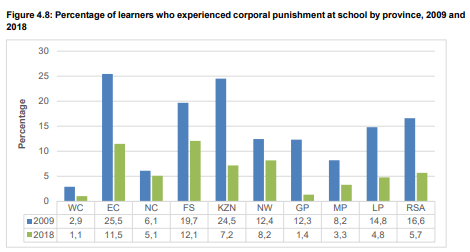Latest stats SA survey shows that Western Cape continues to have the lowest incidents of corporal punishment in the country
Statement by Minister Debbie Schäfer, Minister of Education Western Cape
The latest General Household Survey released by Statistics South Africa reveals that the Western Cape has the lowest number of incidents of learners having experienced corporal punishment in 2018, with the percentage of reported incidents also having decreased when compared to 2009.
In 2018, 1.1% of Western Cape learners reported to have experienced corporal punishment, with the other eight provinces reporting the following:
Western Cape: 1.1%
Gauteng: 1.4%
Mpumalanga: 3.3%
Limpopo: 4.8%
Northern Cape: 5.1%
North West: 8.2%
Free State: 12.1%
KwaZulu Natal: 7.2%
Eastern Cape: 11.5%
SOURCE: Stats SA General Household Survey Report, pg 17.
http://www.statssa.gov.za/publications/P0318/P03182018.pdf
Corporal punishment is illegal in terms of the South African Schools Act.
The WCED views incidents of corporal punishment in a very serious light, and while the number of cases reported independently to Stats SA remains low, the department takes all allegations brought to its attention extremely seriously. The department conducts full investigations into all cases reported and charges anyone found guilty of practising corporal punishment.
The WCED understands the difficulties that some learners pose, and therefore also provides extensive training and support to schools on discipline and positive behaviour programmes via our district offices.
Those providing the training and support include former principals and teachers with many years of experience in dealing with the issue, and professional staff such as school psychologists and social workers. We welcome the contribution that principals and teachers are making towards building a culture of positive behaviour in our schools, often in very difficult circumstances.
There are also a number of programmes in place for district-specific behaviour interventions. Districts are providing an array of skills training in alternative and restorative strategies to deal with learner discipline. Schools are encouraged to contact their district office should they be interested in receiving this training.
I am aware of the many disciplinary challenges our teachers face daily in our schools. While the WCED supports the right to defend oneself in a violent situation, we do not support the use of corporal punishment to deal with ill-disciplined learners.
A school’s code of conduct should state clearly what kinds of behaviour are unacceptable. Should a learner transgress, then the school has the right to discipline the learner through other punitive procedures.
The WCED is also committed to supporting schools instituting disciplinary procedures relating to violence and substance abuse. This is because we take a zero tolerance stance against learners who behave violently and put the safety of fellow learners and teachers at risk.
The WCED’s policy on Learner Discipline and School Management, as well as the WCED Abuse No More protocol document provide guidelines to schools on how to deal with these types of situations.
While there is not a ‘one size fits all’ approach to unruly behaviour in our schools, there are certain methods that can be adopted to deal with different circumstances. These two WCED documents also provide more information on how to discipline learners without using corporal punishment.
Alternatives to corporal punishment:
https://www.westerncape.gov.za/sites/www.westerncape.gov.za/files/documents/2005/7/alternatives_corporal_punishmen.pdf
Learner discipline and school management
https://wcedonline.westerncape.gov.za/documents/LearnerDiscipline/Learner_Discipline_and_School_Management.pdf
I would like to use this opportunity to highlight the importance of reporting any form of abuse, intimidation, victimisation or violence to the WCEDs Safe Schools hotline – 0800 45 46 47. Parents are also encouraged to report incidents to the Principal of the school, and/or the District office.
Educators can also seek support through our district offices or through the Employee Wellness Call Centre: 0800 111 011.
Whist one incident is one too many, I am very pleased at the Western Cape’s figure is low and has decreased, and trust that the zero tolerance approach we have been taking is bearing fruit.
Media Enquiries:
Jessica Shelver
Tel: 021 483 6570
Cell: 076 175 0663
E-mail: Jessica.Shelver@westerncape.gov.za

